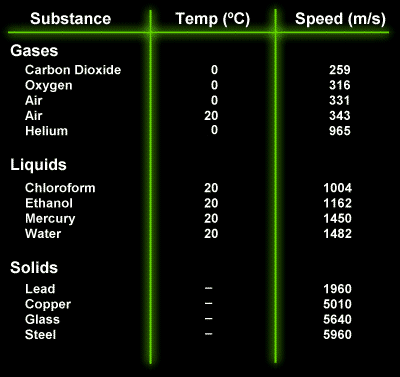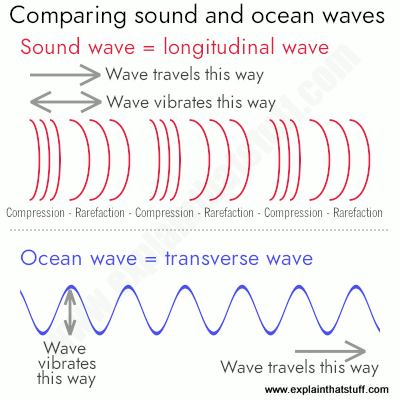Why Does Sound Travel Faster in Warm Air
This means that when sound travels from hot air to cold air or from cold air to hot air it will refract. Sound travels 43 times faster in water than air.
Why Does Speed Of Sound Increase With Temperature As Temperature Rises Particles Move Apart From Each Other Which Would Cause The Sound To Take More Time To Travel Thus Reducing The Speed
The sound waves travels slower in denser medium since it takes more energy to move the molecules but fast in elastic medium.
. Sound travels faster through warm air than through cold air. Higher temperature means that molecules are moving faster. Sound is transferred by collisions of molecules.
Sound needs vibration in order to work so the sound is carried more easily through the air with the more excited molecules than through air with more still molecules cold air. It does travel faster through warm air the molecules in the warm air are more excited and will vibrate more easily. Another results in faster sound.
Why does sound travel faster in warm air. This is because the molecules of air are moving faster and the vibrations of the sound wave can therefore be transmitted faster. At the same temperature water vapor molecules have the same average kinetic energy as the heavier nitrogen and oxygen molecules in the air.
The average mean speed of the molecules of air is faster in warm air than on cool air. A cold air because there is less space between molecules b warm air because it is less dense c cold air because cold air is denser d warm air because molecules are moving faster and therefore carry information faster c none of the above. Now the faster these air molecules vibrate thief faster sound waves can propagate and be transmitted to the surrounding particles at warmer temperatures.
Technically that is correct. At high altitudes where it is much colder sound travels slower. Does sound travel faster in cold air or warm air.
How then do the average speeds of H2O. The higher the temperature the faster the air molecules are moving to begin with and the quicker they bump into each other as a sound. This means that when sound travels from hot air to cold air or from cold air to hot air it will refract.
The fact is sound travels faster in hot air and that is because hot air molecules are more excited so they are moving around incredibly quickly and banging into each other whereas cold air molecules just sort of chill and dont move around much--in effect theyre anti-social. Why does sound travel faster in warm air quizlet. Sound travels faster through warm air than cold air because the molecules in the warm air are vibrating faster.
The speed of sound is greater in hot air than it is in cold air. This is because the molecules of air are moving faster and the vibrations of the sound wave can therefore be transmitted faster. Molecules at higher temperatures have more energy and can vibrate faster and allow sound waves to travel more quickly.
Speed of soundWhy does sound travel faster in summer than in winterWow. Temperature is another condition that affects the speed of sound. I thought sound always travels faster in a denser medium - For eg it travels faster in water than in air.
Since cold air is denser than hot air the speed of sound is more in hot air and hence sound travels faster in hotter gases. Besides with a higher temperature more energy is in the air. And I believe thats because the molecules are packed closer together so the vibrations are transferred faster between them hence more speed.
Therefore the speed of passing a vibration from one molecule to. That was an amazing trickThe television switched on immediately after you cl. At a typical sea level temperature sound travels about 1220 kilometers 760 miles per hour.
Sound travels faster in warm air because the air molecules that compose. At 25 C the speed of sound is 1246 kilometres per. This is to be expected because the faster-moving molecules in warm air bump into each other more often and therefore transmit a pulse.
Heat like sound is a form of kinetic energy. In water the particles are much closer together and they can quickly transmit vibration energy and the sound wave travels over four times faster than it would in air. Speed of sound waves depends on the temperature elasticity and density of the medium.
Heat makes air molecules move around faster so theyre more ready to carry a pressure wave than slower-moving molecules. The speed of sound is greater in hot air than it is in cold air. Sound travels faster in warm air because the particles are moving faster than when they are cold.
It travels faster in. The speed of sound is greater in hot air than it is in cold air. Humidity lowers the density of air so much for humid air feeling heavy which makes it travel slightly faster.
The speed of sound at room temperature air is 346 meters per second. Therefore sound waves will travel faster on warm air because. With more energy particles are able to vibrate faster thus increasing the speed of sound.
The air particles will move faster since they have a higher kinetic energy which is due to the higher temperature. Why does sound travel faster in moist air. Sound is a mechanical wave meaning that it must.
Kim Strong a professor of physics at the University of Toronto says the answer is yes in fact sound travels faster when the air is hotter. The speed of sound in the air mainly depends on temperature. But then why does sound travel in less dense warmer air than in dense cold air.
This is because the molecules of air are moving faster and the vibrations of the sound wave can therefore be transmitted faster. Because of that heat makes sound travel faster too.

Why Does Sound Travel Faster In Summer Than In Winter Aumsum Kids Science Education Children Youtube

Does Sound Travel Faster In Warm Or Cold Air Dr How S Science Wows


No comments for "Why Does Sound Travel Faster in Warm Air"
Post a Comment